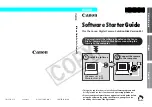
Selection of devices
You need separate devices to be used with the source media and the target media.
The destination devices can have a larger block size than the source devices.
However, to avoid impact on performance, it is recommended that the devices have
the same block size and are connected to the same system or to a SAN environment.
Object copying is load balanced by default. Data Protector makes optimum use of
the available devices by utilizing as many devices as possible.
If you do not specify the source devices to be used in the object copy specification,
Data Protector uses the default devices. By default, the devices that were used for
writing the objects are used as source devices. If destination devices are not specified
per object, Data Protector selects them automatically from those you selected in the
object copy specification according to the following criteria in the order of priority:
•
destination devices of the same block size as source devices are selected before
those with a different block size
•
locally attached devices are selected before network attached devices
Devices are locked at the beginning of the session. Devices that are not available at
that time cannot be used in the session, as device locking after the beginning of the
session is not possible. If a media error occurs, the device with errors will be avoided
within that copy session.
Selection of the media set to copy from
If an object version that you want to copy exists on more than one media set, which
has been created using one of the Data Protector data duplication methods, any of
the media sets can be used as a source for copying. You can influence the media
set selection by specifying the media location priority.
The overall process of media selection is the same as for restore. For details, see
“
Selection of the media set
” on page 126.
Object copy session performance
An impact on object copy performance can be caused by factors such as device
block sizes and the connection of devices. If the devices used in the object copy
session have different block sizes, the data will be repackaged during the session,
which takes additional time and resources. If the data is transferred over the network,
there will be additional network load and time consumption. This impact can be
minimized if the operation is load balanced.
Concepts guide
115
Summary of Contents for B6960-96035
Page 17: ...Overview of backup and automated media copy sessions 340 105 Concepts guide 17 ...
Page 20: ...20 ...
Page 22: ...Publication history 22 ...
Page 132: ...Planning your backup strategy 132 ...
Page 182: ...Media management and devices 182 ...
Page 186: ...Users and user groups 186 ...
Page 204: ...The Data Protector internal database 204 ...
Page 218: ...Figure 62 Direct SIP integration example Service management 218 ...
Page 242: ...Integration with database applications 242 ...
Page 264: ...Synthetic backup 264 ...
Page 274: ...Split mirror concepts 274 ...
Page 288: ...Snapshot concepts 288 ...
Page 344: ...Further information 344 ...
Page 402: ...Glossary 402 ...
















































